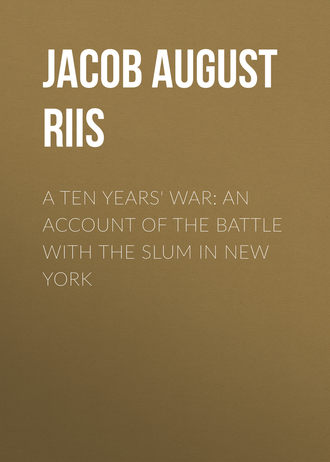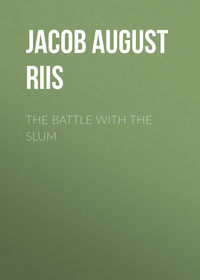 полная версия
полная версияA Ten Years' War: An Account of the Battle with the Slum in New York
"Everything takes ten years." Looking back from the closing year of the century, one is almost tempted to turn Mr. Hewitt's phrase about, and say that everything has been packed into ten years. The tenth winter of the free lectures, which the city provides to fill up in a measure those gaps which the earlier years left, has just passed. When the first course showed an attendance of 22,149 upon 186 lectures, we were all encouraged; but the last season saw 1923 lectures delivered upon every topic of human interest, from the care of our bodies and natural science to literature, astronomy, and music, and a multitude of 519,411 persons, chiefly workingmen and their wives, the parents of the schoolboy, heard them. Forty-eight schools and halls were employed for the purpose. The People's Institute adds to this programme a forum for the discussion of social topics, nineteenth-century history, and "present problems" on a wholly non-partisan, unsectarian basis. The Institute was launched upon its educational mission within six weeks after the disastrous Greater New York election in 1897. It has since drawn to the platform of the Cooper Institute audiences, chiefly of workingmen more or less connected with the labor movement, that have filled its great hall. The spirit that animates its work is shown in its review of the field upon the threshold of its third year. Speaking of the social issues that are hastening toward a settlement, it says: "Society is about to be organized, gradually, wisely, on the lines of the recognition of the brotherhood of man. The People's Institute holds to-day, as no other institution in this city, the confidence of all classes of the working people; also of the best minds among the well-to-do classes. It can throw all its influence upon the side of removing misunderstandings, promoting mutual confidence.... This is its great work." A great undertaking, truly, but one in which no one may rashly say it shall not succeed. As an installment, it organized last spring, for study, discussion, and social intercourse, the first of a chain of People's Clubs, full of a strong and stirring life, which within three months had a membership of three hundred and fifty, and a list of two hundred and fifty applicants.
While the Institute's plan has met with this cordial reception downtown, uptown, among the leisure classes, its acceptance has been nothing like so ready. Selfish wealth has turned a cold shoulder to the brotherhood of man, as so often in the past. Still the proffered hand is not withdrawn. In a hundred ways it is held out with tender of help and sympathy and friendship, these days, where distrust and indifference were once the rule. The People's University Extension Society, leaving the platform to its allies, invades the home, the nursery, the kindergarten, the club, wherever it can, with help and counsel. Down on the lower East Side, the Educational Alliance conducts from the Hebrew Institute an energetic campaign among the Jewish immigrants that reaches fully six thousand souls, two thirds of them children, every day in the week. Sixty-two clubs alone hold meetings in the building on Saturday and Sunday. Under the same roof the Baron Hirsch Fund has taught sixteen thousand children of refugee Jews in nine years. It passes them on to the public schools within six months of their landing, the best material they receive from anywhere.
So the boy is being got ready for dealing, in the years that are to come, with the other but not more difficult problems of setting his house to rights, and ridding it of the political gang which now misrepresents him and us. And justice to Jacob is being evolved. Not yet without obstruction and dragging of feet. The excellent home library plan that proved so wholesome in the poor quarters of Boston has failed in New York, except in a few notable instances, through the difficulty of securing the visitors upon whom the plan depends for its success. The same want has kept the boys' club from reaching the development that would apply the real test to it as a barrier against the slum. There are fifteen clubs for every Winifred Buck that is in sight. From the City History Club, the Charity Organization Society, from everywhere, comes the same complaint. The hardest thing in the world to give is still one's self. But it is all the time getting to be easier. There are daily more women and men who, thinking of the boy, can say, and do, with my friend of the College Settlement, when an opportunity to enter a larger field was offered her, "No, I am content to stay here, to be ready for Johnnie when he wants me."
Justice for the boy, and for his father. An itinerant Jewish glazier, crying his wares, was beckoned into a stable by the foreman, and bidden to replace a lot of broken panes, enough nearly to exhaust his stock. When, after working half the day, he asked for his pay, he was driven from the place with jeers and vile words. Raging and impotent, he went back to his poor tenement cursing a world in which there was no justice for a poor man. If he had next been found ranting with anarchists against the social order, would you have blamed him? He found instead, in the Legal Aid Society, a champion that pleaded his cause and compelled the stableman to pay him his wages. For a hundred thousand such—more shame to us—this society has meant all that freedom promised: justice to the poor man. It too has earned a place among the forces that are working out through the new education the brighter day, for it has taught the lesson which all the citizens of a free state need most to learn,—respect for law.
VIII
REFORM BY HUMANE TOUCH
I have sketched in outline the gains achieved in the metropolis since its conscience awoke. Now, in closing this account, I am reminded of the story of an old Irishman who died here a couple of years ago. Patrick Mullen was an honest blacksmith. He made guns for a living. He made them so well that one with his name on it was worth a good deal more than the market price of guns. Other makers went to him with offers of money for the use of his stamp; but they never went twice. When sometimes a gun of very superior make was brought to him to finish, he would stamp it P. Mullen, never Patrick Mullen. Only to that which he himself had wrought did he give his honest name without reserve. When he died, judges and bishops and other great men crowded to his modest home by the East River, and wrote letters to the newspapers telling how proud they had been to call him friend. Yet he was, and remained to the end, plain Patrick Mullen, blacksmith and gunmaker.
In his life he supplied the answer to the sigh of dreamers in all days: when will the millennium come? It will come when every man is a Patrick Mullen at his own trade; not merely a P. Mullen, but a Patrick Mullen. The millennium of municipal politics, when there shall be no slum to fight, will come when every citizen does his whole duty as a citizen; not before. As long as he "despises politics," and deputizes another to do it for him, whether that other wears the stamp of a Croker or of a Platt,—it matters little which,—we shall have the slum, and be put periodically to the trouble and the shame of draining it in the public sight. A citizen's duty is one thing that cannot be farmed out safely; and the slum is not limited by the rookeries of Mulberry or Ludlow streets. It has long roots that feed on the selfishness and dullness of Fifth Avenue quite as greedily as on the squalor of the Sixth Ward. The two are not nearly so far apart as they look.
I am not saying this because it is anything new, but because we have just had an illustration of its truth in municipal politics. Waring and Roosevelt were the Patrick Mullens of the reform administration which Tammany has now replaced with her insolent platform, "To hell with reform." It was not an ideal administration, but it can be said of it, at least, that it was up to the times it served. It made compromises with spoils politics, and they were wretched failures. It took Waring and Roosevelt on the other plan, on which they insisted, of divorcing politics from the public business, and they let in more light than even my small parks over on the East Side. For they showed us where we stood and what was the matter with us. We believed in Waring when he demonstrated the success of his plan for cleaning the streets: not before. When Roosevelt announced his programme of enforcing the excise law because it was law, a howl arose that would have frightened a less resolute man from his purpose. But he went right on doing the duty he was sworn to do. And when, at the end of three months of clamor and abuse, we saw the spectacle of the saloon keepers formally resolving to help the police instead of hindering them; of the prison ward in Bellevue Hospital standing empty for three days at a time, an astonishing and unprecedented thing, which the warden could only attribute to the "prompt closing of the saloons at one A. M.;" and of the police force recovering its lost self-respect, we had found out more and greater things than whether the excise law was a good or a bad law. We understood what Roosevelt meant when he insisted upon the "primary virtues" of honesty and courage in the conduct of public business. For the want of them in us, half the laws that touched our daily lives had become dead letters or vehicles of blackmail and oppression. It was worth something to have that lesson taught us in that way; to find out that simple, straightforward, honest dealing as between man and man is after all effective in politics as in gunmaking. Perhaps we have not mastered the lesson yet. But we have not discharged the teacher, either.
Courage, indeed! There were times during that stormy spell when it seemed as if we had grown wholly and hopelessly flabby as a people. All the outcry against the programme of order did not come from the lawless and the disorderly, by any means. Ordinarily decent, conservative citizens joined in counseling moderation and virtual compromise with the law-breakers—it was nothing else—to "avoid trouble." The old love of fair play had been whittled down by the jackknife of all-pervading expediency to an anæmic desire to "hold the scales even;" that is a favorite modern device of the devil for paralyzing action in men. You cannot hold the scales even in a moral issue. It inevitably results in the triumph of evil, which asks nothing better than the even chance to which it is not entitled. When the trouble in the Police Board had reached a point where it seemed impossible not to understand that Roosevelt and his side were fighting a cold and treacherous conspiracy against the cause of good government, we had the spectacle of a Christian Endeavor Society inviting the man who had hatched the plot, the bitter and relentless enemy whom the Mayor had summoned to resign, and afterward did his best to remove as a fatal obstacle to reform,—inviting this man to come before it and speak of Christian citizenship! It was a sight to make the bosses hug themselves with glee. For Christian citizenship is their nightmare, and nothing is so cheering to them as evidence that those who profess it have no sense.
Apart from the moral bearings of it, what this question of enforcement of law means in the life of the poor was illustrated by testimony given before the Police Board very recently. A captain was on trial for allowing the policy swindle to go unchecked in his precinct. Policy is a kind of penny lottery, with alleged daily drawings which never take place. The whole thing is a pestilent fraud, which is allowed to exist only because it pays heavy blackmail to the police and the politicians. Expert witnesses testified that eight policy shops in the Twenty-First Ward, which they had visited, did a business averaging about thirty-two dollars a day each. The Twenty-First is a poor Irish tenement ward. The policy sharks were getting two hundred and fifty dollars or more a day of the hard-earned wages of those poor people, in sums of from one and two cents to a quarter, without making any return for it. The thing would seem incredible, were it not too sadly familiar. The saloon keeper got his share of what was left, and rewarded his customer by posing as the "friend of the poor man" whenever his business was under scrutiny; I have yet in my office the record of a single week during the hottest of the fight between Roosevelt and the saloons, as showing of what kind that friendship is. It embraces the destruction of eight homes by the demon of drunkenness: the suicide of four wives, the murder of two others by drunken husbands, the killing of a policeman in the street, and the torture of an aged woman by her rascal son, who "used to be a good boy till he took to liquor, when he became a perfect devil." In that rôle he finally beat her to death for giving shelter to some evicted fellow tenants who else would have had to sleep in the street. Nice friendly turn, wasn't it?
And yet there was something to be said for the saloon keeper. He gave the man the refuge from his tenement which he needed. I say needed, purposely. There has been a good deal of talk lately about the saloon as a social necessity. About all there is to that is that the saloon is there, and the necessity too. Man is a social animal, whether he lives in a tenement or in a palace. But the palace has resources; the tenement has not. It is a good place to get away from at all times. The saloon is cheery and bright, and never far away. The man craving human companionship finds it there. He finds, too, in the saloon keeper one who understands his wants much better than the reformer who talks civil service in the meetings. "Civil service" to him and his kind means yet a contrivance for keeping them out of a job. The saloon keeper knows the boss, if he is not himself the boss or his lieutenant, and can steer him to the man who will spend all day at the City Hall, if need be, to get a job for a friend, and all night pulling wires to keep him in it, if trouble is brewing. Mr. Beecher used to say, when pleading for bright hymn tunes, that he didn't want the devil to have the monopoly of all the good music in the world. The saloon has had the monopoly up to date of all the cheer in the tenements. If its owner has made it pan out to his own advantage and the boss's, we at least have no just cause of complaint. We let him have the field all to himself.
As to this boss, of whom we hear so much, what manner of man is he? That depends on how you look at him. I have one in mind, a district boss, whom you would accept instantly as a type, if I were to mention his name, which I shall not do for a reason which I fear will shock you: he and I are friends. In his private capacity I have real regard for him. As a politician and a boss I have none at all. I am aware that this is taking low ground in a discussion of this kind, but perhaps the reader will better understand the relations of his "district" to him, if I let him into mine. There is no political bond between us, of either district or party; just the reverse. It is purely personal. He was once a police justice,—at that time he kept a saloon,—and I never knew one with more common sense, which happens to be the one quality especially needed in that office. Up to the point where politics came in I could depend upon him entirely. At that point he let me know bluntly that he was in the habit of running his district to suit himself. The way he did it brought him under the just accusation of being guilty of every kind of rascality known to politics. When next our paths would cross each other, it would very likely be on some errand of mercy, to which his feet were always swift. I recall the distress of a dear and gentle lady at whose dinner table I once took his part. She could not believe that there was any good in him; what he did must be done for effect. Some time after that she wrote asking me to look after an East Side family that was in great trouble. It was during the severe cold spell of last winter, and there was need of haste. I went over at once; but although I had lost no time, I found my friend the boss ahead of me. It was a real pleasure to me to be able to report to my correspondent that he had seen to their comfort, and to add that it was unpolitical charity altogether. The family was that of a Jewish widow with a lot of little children. He is a Roman Catholic. There were no men, consequently no voters, in the house, which was far outside of his district, too; and as for effect, he was rather shamefaced at my catching him at it. I do not believe that a soul has ever heard of the case from him to this day.
My friend is a Tammany boss. During that same cold spell a politician of the other camp came into my office and gave me a hundred dollars to spend as I saw fit among the poor. His district was miles uptown, and he was most unwilling to disclose his identity, stipulating in the end that no one but I should know where the money came from. He was not seeking notoriety. The plight of the suffering had appealed to him, and he wanted to help where he could, that was all.
Now, I have not the least desire to glorify the boss in this. He is not glorious to me. He is simply human. Often enough he is a coarse and brutal fellow, in his morals as in his politics. Again, he may have some very engaging personal traits that bind his friends to him with the closest of ties. The poor man sees the friend, the charity, the power that is able and ready to help him in need; is it any wonder that he overlooks the source of this power, this plenty,—that he forgets the robbery in the robber who is "good to the poor"? Anyhow, if anybody got robbed, it was "the rich." With the present ethical standards of the slum, it is easy to construct even a scheme of social justice out of it that is very comforting all round, even to the boss himself, though he is in need of no sympathy or excuse. "Politics," he will tell me in his philosophic moods, "is a game for profit. The city foots the bills." Patriotism means to him working for the ticket that shall bring more profit. "I regard," he says, lighting his cigar, "a repeater as a shade off a murderer, but you are obliged to admit that in my trade he is a necessary evil." I am not obliged to do anything of the kind, but I can understand his way of looking at it. He simply has no political conscience. He has gratitude, loyalty to a friend,—that is part of his stock in trade,—fighting blood, plenty of it, all the good qualities of the savage; nothing more. And a savage he is, politically, with no soul above the dross. He would not rob a neighbor for the world; but he will steal from the city—though he does not call it by that name—without a tremor, and count it a good mark. When I tell him that, he waves his hand toward Wall Street as representative of the business community, and toward the office of his neighbor, the padrone, as representative of the railroads, and says with a laugh, "Don't they all do it?"
The boss believes in himself. It is one of his strong points. And he has experience to back him. In the fall of 1894 we shook off boss rule in New York, and set up housekeeping for ourselves. We kept it up three years, and then went back to the old style. I should judge that we did it because we were tired of too much virtue. Perhaps we were not built to hold such a lot at once. Besides, it is much easier to be ruled than to rule. That fall, after the election, when I was concerned about what would become of my small parks, of the Health Department in which we took such just pride, and of a dozen other things, I received one unvarying reply to my anxious question, or rather two. If it was the Health Department, I was told: "Go to Platt. He is the only man who can do it. He is a sensible man, and will see that it is protected." If small parks, it was: "Go to Croker. He will not allow the work to be stopped." A playgrounds bill was to be presented in the legislature, and everybody advised: "Go to Platt. He won't have any objection: it is popular." And so on. My advisers were not politicians. They were business men, but recently honestly interested in reform. I was talking one day with a gentleman of very wide reputation as a philanthropist, about the unhappy lot of the old fire-engine horses,—which, after lives of toil that deserve a better fate, are sold for a song to drag out a weary existence hauling some huckster's cart around,—and wishing that they might be pensioned off to live out their years on a farm, with enough to eat and a chance to roll in the grass. He was much interested, and promptly gave me this advice: "I tell you what you do. You go and see Croker. He likes horses." No wonder the boss believes in himself. He would be less than human if he did not. And he is very human.
I had voted on the day of the Greater New York election,—the Tammany election, as we learned to call it afterward,—in my home out in the Borough of Queens, and went over to the depot to catch the train for the city. On the platform were half a dozen of my neighbors, all business men, all "friends of reform." Some of them were just down from breakfast. One I remembered as introducing a resolution, in a meeting we had held, about the discourtesy of local politicians. He looked surprised when reminded that it was election day. "Why, is it to-day?" he said. "They didn't send any carriage," said another regretfully. "I don't see what's the use," said the third; "the roads are just as bad as when we began talking about it." (We had been trying to mend them.) The fourth yawned and said: "I don't care. I have my business to attend to." And they took the train, which meant that they lost their votes. The Tammany captain was busy hauling his voters by the cartload to the polling place. Over there stood a reform candidate who had been defeated in the primary, and puffed out his chest. "The politicians are afraid of me," he said. They slapped him on the back, as they went by, and told him that he was a devil of a fellow.
So Tammany came back. The Health Department is wrecked. The police force is worse than before Roosevelt took hold of it, and we are back in the mud out of which we pulled ourselves with such an effort. And we are swearing at it. But I am afraid we are swearing at the wrong fellow. The real Tammany is not the conscienceless rascal that plunders our treasury and fattens on our substance. That one is a mere counterfeit. It is the voter who waits for a carriage to take him to the polls, the man who "doesn't see what's the use;" the business man who says "business is business," and has no time to waste on voting; the citizen who "will wait to see how the cat jumps, because he doesn't want to throw his vote away;" the cowardly American who "doesn't want to antagonize" anybody; the fool who "washes his hands of politics." These are the real Tammany, the men after the boss's own heart. For every one whose vote he buys, there are two of these who give him theirs for nothing. We shall get rid of him when these withdraw their support, when they become citizens of the Patrick Mullen stamp, as faithful at the polling place as he was at the forge; not before.
The true work of reform is at the top, not at the bottom. The man in the slum votes according to his light, and the boss holds the candle. But the boss is in no real sense a leader. He follows instead, always as far behind the moral sentiment of the community as he thinks is safe. He has heard it said that a community will not be any better than its citizens, and that it will be just as good as they are, and he applies the saying to himself. He is no worse a boss than the town deserves. I can conceive of his taking credit to himself as some kind of a moral instrument by which the virtue of the community may be graded, though that is most unlikely. He does not bother himself with the morals of anything. But right here is his Achilles heel. The man has no conscience. He cannot tell the signs of it in others. It always comes upon him unawares. Reform to him simply means the "outs" fighting to get in. The real thing he will always underestimate. Such a man is not the power he seems. He is formidable only in proportion to the amount of shaking it takes to rouse the community's conscience.
The boss is like the measles, a distemper of a self-governing people's infancy. When we shall have come of age politically, he will have no terrors for us. Meanwhile, being charged with the business of governing, which we left to him because we were too busy making money, he follows the track laid out for him, and makes the business pan out all that is in it. He fights when we want to discharge him. Of course he does. No man likes to give up a good job. He will fight or bargain, as he sees his way clear. He will give us small parks, play piers, new schools, anything we ask, to keep his place, while trying to find out "the price" of this conscience which he does not understand. Even to the half of his kingdom he will give, to be "in" on the new deal. He has done it before, and there is no reason that he can see why it should not be done again. And he will appeal to the people whom he is plundering to trust him because they know him.









